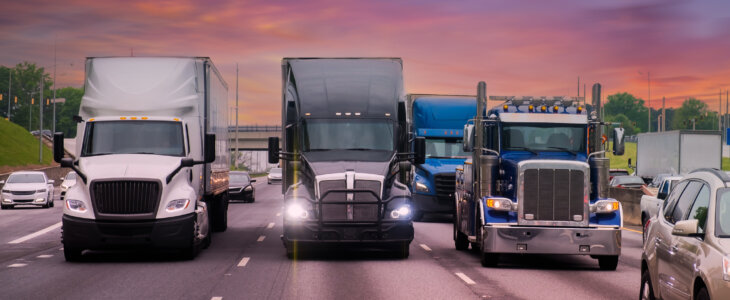Trucking accidents are unfortunately common on Florida’s highways, often leading to devastating consequences for those involved. These accidents are not just unfortunate events; they can also be legally complex, especially when determining liability. Knowing the legal grounds on which a trucking company can be held accountable is essential for anyone involved in such incidents.
In this blog post, Staples Law Group will explore the common causes of trucking accidents, the legal foundations for holding trucking companies liable, and the specific laws in Florida that govern these cases. Our goal is to provide you with the knowledge and resources needed to navigate the aftermath of a trucking accident and understand how we can assist you in securing the compensation you deserve.
Common Causes of Trucking Accidents
Trucking accidents are often the result of multiple factors, many of which can be traced back to negligence or poor practices by the truck driver or the trucking company. Understanding these common causes can help identify who may be liable and how these accidents could have been prevented.
Driver Fatigue
One of the leading causes of trucking accidents is driver fatigue. Truck drivers are often required to work long hours to meet tight deadlines, leading to exhaustion and impaired judgment. Despite federal regulations that mandate rest periods, some companies push their drivers to exceed these limits, creating dangerous conditions on the road.
Improper Maintenance
Trucking companies are responsible for maintaining their vehicles to ensure they operate safely. However, some companies may neglect necessary repairs or skip routine maintenance checks to cut costs.
Overloaded or Improperly Loaded Cargo
Proper cargo loading is critical to a truck’s safe operation. Overloading a truck or improperly securing cargo can make the vehicle difficult to control, increasing the likelihood of rollovers, jackknifes, and other accidents.
Speeding and Reckless Driving
To meet delivery deadlines, truck drivers may engage in speeding or other reckless driving behaviors, such as tailgating or making aggressive lane changes. These actions significantly increase the risk of an accident, particularly given a truck’s size and weight, which requires a longer distance to stop and is harder to maneuver.
Distracted Driving
Distracted driving is a growing problem on the road, and truck drivers are not immune. Whether using a phone, eating, or adjusting the radio, distractions can divert a driver’s attention from the road, leading to severe accidents. Trucking companies that fail to enforce strict no-distraction policies may be liable if distracted driving causes an accident.
By understanding these common causes, victims of trucking accidents and their families can better grasp how negligence may have contributed to their situation.
Legal Basis for Trucking Company Liability
The company may be held liable under several legal principles when a trucking accident occurs. Understanding these can help victims pursue justice and compensation.
- Vicarious Liability: Under vicarious liability, a trucking company can be held responsible for its drivers’ actions while performing job-related duties. If a driver’s negligence, such as speeding or distracted driving, causes an accident, the company may be liable for the resulting damages.
- Negligent Hiring and Retention: Trucking companies have a duty to hire qualified and safe drivers. If a company fails to conduct proper background checks, hires drivers with a history of reckless behavior, or retains drivers who pose a known risk, they can be held liable for accidents caused by these individuals.
- Failure to Properly Train Drivers: Inadequate training is another basis for liability. Trucking companies are responsible for ensuring their drivers are adequately trained to handle the vehicles safely and comply with regulations. The company may be held accountable if a lack of training leads to an accident.
- Violation of Federal Regulations: Trucking companies must adhere to federal regulations set by the Federal Motor Carrier Safety Administration (FMCSA). These regulations cover hours of service, vehicle maintenance, and other safety protocols. A company’s violation of these regulations, such as forcing drivers to exceed legal driving hours, can be a significant factor in establishing liability.
By understanding these legal bases, victims can seek compensation from the parties responsible for their injuries and losses more effectively.
Florida-Specific Laws and Regulations
Trucking accidents in Florida are governed by federal regulations and state-specific laws. Understanding these laws is crucial for anyone involved in a trucking accident, as they can significantly impact the outcome of a legal case.
- Florida Statutes Relevant to Trucking Accidents: Florida has several trucking and commercial vehicle accident statutes. These laws outline the responsibilities of trucking companies and drivers, including proper licensing, weight limits, and safety requirements. Violations of these statutes can be used as evidence of negligence in an accident claim.
- Florida’s Modified Comparative Negligence: Florida recently adopted a modified comparative negligence system, which can significantly impact trucking accident cases. Under this system, a victim can only recover damages if they are found to be less than 51% at fault for the accident. If the victim’s percentage of fault reaches 51% or higher, they are barred from recovering any compensation.
These Florida-specific laws and regulations are important in determining liability and compensation in trucking accident cases. Victims should know these rules to navigate the legal process better and protect their rights.
Protect Your Rights After a Trucking Accident
Trucking accidents can have life-altering consequences, but you don’t have to face the aftermath alone. Understanding the complexities of liability, especially under Florida’s specific laws, is essential for securing the compensation you deserve.
If you or a loved one has been involved in a trucking accident, contact us today for a consultation. Let us help you take the first step towards justice and recovery.

